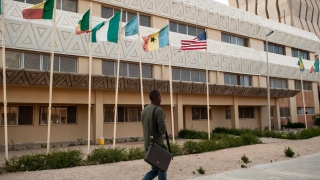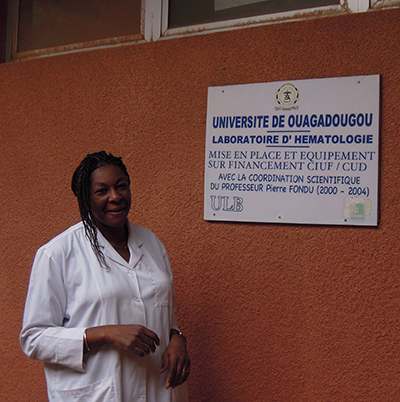Combating Sickle cell disease
— The world’s leading genetic disease —

Sickle cell disease is a serious chronic genetic affliction that is believed to affect more than 300,000 infants in sub-Saharan Africa each year. These figures motivated Fondation Pierre Fabre to join the fight against this little publicised disease in 2006.
________
Sickle-cell disease, the world’s most widespread genetic disease – particularly in Africa –, affects the haemoglobin, resulting in very painful, acute attacks and potentially fatal complications, especially in children.
Approximately 50 million people worldwide are carriers of sickle cell trait and therefore likely to transmit this genetic haemoglobin disorder to their offspring. This disease, emblematic of the populations of Africa and its diaspora, limits the life expectancy of those afflicted if they do not receive proper treatment: it is thought that half the children die before the age of five.
As a “neglected” and under-diagnosed illness, sickle-cell disease is a global health concern that is nevertheless not addressed by major international aid programmes. The Fondation Pierre Fabre has been dedicated to fighting this disease for over a decade, with several clear objectives: improve screening and treatment, train healthcare professionals and encourage research, while serving as a powerful advocate for those with sickle-cell disease to help make the illness a global health priority.
The Foundation is focusing its efforts on neonatal screening for the disease, an uncommon practice in Africa, and facilitating access to proper care. Starting with the Research Centre to combat sickle cell disease (CRLD) founded in Bamako, it intends to broadly disseminate the necessary skills for this battle elsewhere on the continent and in the Caribbean region, and forge effective South-South collaborations.
 |
 |
 |
| Prevention, diagnosis and treatment of sickle cell disease — Burkina Faso — |
Creating and developing the Research Centre to combat sickle cell disease — Mali — |
Support for the Sickle Cell Research and Treatment Centre (CRTD) — Central African Republic — |
 |
 |
 |
| Feasibility study for a sickle cell disease treatment programme — Haiti — |
Support for the Sickle Cell Disease Control Centre — Guinea — |
Supporting the fight against sickle cell disease in Sub-Saharan Africa — Cameroon, Central African Republic, Côte d’Ivoire, Democratic Republic of Congo — |
 |
 |
 |
| Support for the sickle cell treatment unit at the Centre Hospitalier Monkole — RDC — |
Supporting a programme to fight sickle cell disease — Madagascar — |
Strengthening management of sickle cell disease in Bangui — République centrafricaine — |
 |
 |
|
| Operational study on early detection and treatment of sickle cell disease — Sénégal — |
Improving healthcare and social services for those with sickle cell disease — Cameroon, Congo-Brazzaville, Madagascar, DRC — |
Follow our action
Pierre Fabre Fondation 2023 Annual Report
The Fondation Pierre Fabre is heir to the humanistic values and tireless commitment of its founder, Pierre Fabre, who instructed that it should participate “humbly but effectively in improving access to healthcare for the most disadvantaged populations, a key factor in a country’s development”. The Foundation’s status and the way it operates are valuable assets that help it stay true to its defence of the world’s least privileged communities. That commitment manifests itself in the form of an operational strategy based on three key areas of support: training, caring and innovating.
Twenty-five years ago, the Fondation Pierre Fabre was recognized as a public-interest foundation
This was an essential step for Pierre Fabre, who was personally involved in obtaining that status. This recognition provided the assurance of reliability and steadfast presence, and also authorized the receipt of grants, donations and bequests by virtue of its public-interest mission.
Skin cancers: managing pain and improving palliative care in Côte d’Ivoire
In Côte d'Ivoire, Pierre Fabre Foundation have begun training medical teams in palliative care and pain management to meet this priority need.







